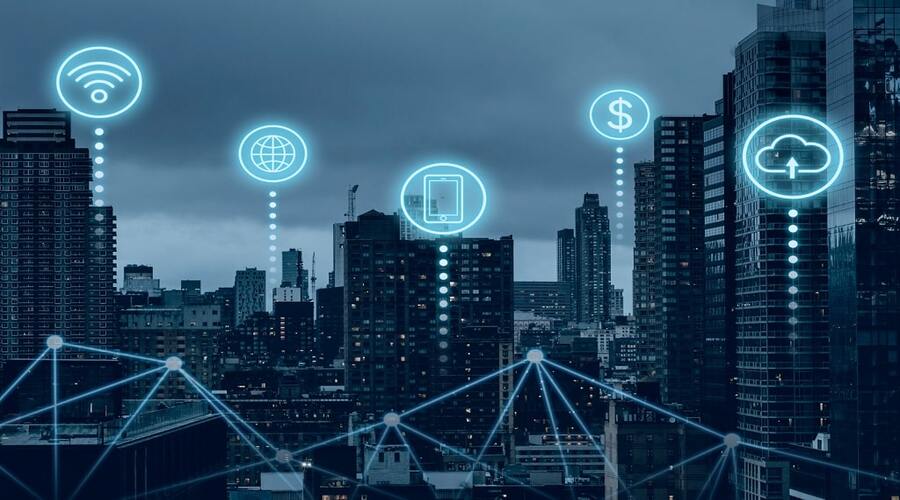

Introduction
As the Internet of Things (IoT) continues to expand, ensuring trust and transparency in IoT ecosystems becomes paramount. The decentralized and distributed nature of IoT networks presents challenges in terms of security, privacy, and data integrity. However, blockchain technology has emerged as a powerful solution to address these challenges. In this article, we will explore the role of blockchain in ensuring trust and transparency in IoT ecosystems, discussing its key features, benefits, and real-world applications.
Understanding Blockchain Technology
What is Blockchain?
Blockchain is a decentralized and immutable ledger that records transactions in a transparent and secure manner. It consists of a chain of blocks, where each block contains a set of transactions. These blocks are linked together using cryptographic hashes, creating a tamper-proof and transparent record of all transactions.
Key Features of Blockchain
- Decentralization: Blockchain operates in a decentralized manner, where multiple participants (nodes) maintain a copy of the blockchain and validate transactions through consensus mechanisms. This eliminates the need for a central authority, reducing the risk of single points of failure or manipulation.
- Transparency: All transactions recorded on the blockchain are transparent and visible to all participants. This promotes accountability and trust, as the entire transaction history is accessible and verifiable by anyone in the network.
- Immutability: Once a transaction is recorded on the blockchain, it becomes virtually immutable. Modifying or tampering with a transaction would require the consensus of the majority of participants, making the blockchain highly resistant to fraud or unauthorized changes.
Ensuring Trust and Transparency in IoT Ecosystems with Blockchain


Enhanced Security and Data Integrity
Blockchain technology enhances security and data integrity in IoT ecosystems by providing a tamper-proof and transparent record of transactions. IoT devices can securely record data and transactions on the blockchain, ensuring that the information remains unchanged and verifiable. This prevents unauthorized access, tampering, or manipulation of IoT-generated data, promoting trust among stakeholders.
Immutable Audit Trails and Traceability
Blockchain enables the creation of immutable audit trails and traceability in IoT ecosystems. Each transaction recorded on the blockchain contains a timestamp, cryptographic signature, and reference to the previous transaction, creating a transparent and auditable trail of activities. This is particularly valuable in industries such as supply chain management, where stakeholders can trace the origin, journey, and conditions of products, ensuring transparency and accountability.
Decentralized Identity Management
Blockchain-based identity management solutions provide a decentralized and secure framework for managing identities in IoT ecosystems. Rather than relying on centralized identity providers, blockchain allows individuals and devices to have self-sovereign identities, where they have control over their personal data and can selectively share information as needed. This enhances privacy, reduces the risk of identity theft, and promotes user autonomy in IoT interactions.
Smart Contracts and Automated Governance
Smart contracts, self-executing agreements coded on the blockchain, enable automated governance and decision-making in IoT ecosystems. By embedding predefined rules and conditions in smart contracts, stakeholders can automate transactions, enforce agreements, and enable trustless interactions. This eliminates the need for intermediaries and reduces the potential for disputes or errors, enhancing the efficiency and transparency of IoT operations.
Real-World Applications of Blockchain in IoT
- Supply Chain Management: Blockchain can revolutionize supply chain management by providing end-to-end visibility, traceability, and transparency. IoT devices can record transactions related to the movement of goods, verifying their authenticity, and condition at each stage. This ensures transparency, reduces fraud, and enables efficient supply chain operations.
- Energy Trading and Grid Management: Blockchain enables peer-to-peer energy trading and decentralized energy grid management. IoT devices such as smart meters and solar panels can record energy production and consumption on the blockchain, facilitating transparent and automated energy trading among participants. This promotes renewable energy adoption, reduces costs, and enhances energy grid efficiency.
- Healthcare Data Management: Blockchain can improve healthcare data management by providing secure and interoperable access to patient records. IoT devices, such as wearables and medical devices, can securely record health data on the blockchain, allowing authorized healthcare providers to access and update patient information seamlessly. This enhances data security, privacy, and patient-centric care.
Blockchain-based Data Marketplaces
Blockchain technology enables the development of decentralized data marketplaces in IoT ecosystems. These marketplaces allow individuals and organizations to securely trade and monetize IoT-generated data. By leveraging blockchain’s transparency and immutability, participants can have confidence in the quality and provenance of the data being exchanged. Blockchain-based smart contracts facilitate automated data transactions, ensuring fair and reliable data exchange without the need for intermediaries.
Supply Chain Transparency and Trust
Blockchain enhances supply chain transparency and trust in IoT ecosystems. By recording supply chain data on the blockchain, stakeholders can track and verify the movement of goods, ensuring that they adhere to quality standards, regulations, and ethical sourcing practices. This transparency helps combat counterfeiting, improves product traceability, and builds trust among consumers by providing verifiable information about the origin and journey of products.
Immutable Intellectual Property Protection
Blockchain technology can protect intellectual property rights in IoT ecosystems. Through blockchain-based timestamping and digital fingerprinting, creators can securely register their intellectual property assets, such as designs, patents, or digital content. The immutable nature of the blockchain ensures the authenticity and ownership of these assets, providing proof of existence and reducing the risk of intellectual property infringement.
Decentralized Access Control and IoT Device Management
Blockchain-based access control mechanisms offer decentralized and secure management of IoT devices. By leveraging blockchain’s cryptographic features, identities and access permissions for IoT devices can be securely stored and managed. This enables granular control over device access, ensuring that only authorized entities can interact with IoT devices. Blockchain-based device management also facilitates automatic updates, device integrity verification, and secure firmware distribution.
Trustworthy Data Sharing and Collaboration
Blockchain promotes trustworthy data sharing and collaboration in IoT ecosystems. By implementing blockchain-based data sharing platforms, organizations can securely exchange and share data with trusted partners or stakeholders. Smart contracts facilitate data-sharing agreements, ensuring that data is shared according to predefined rules and conditions. This promotes collaboration, data interoperability, and innovation in IoT applications that require multi-party data sharing.
Scalability and Performance Enhancements
To address the scalability and performance challenges of blockchain in IoT ecosystems, various solutions are being developed. These include off-chain transactions, sidechains, sharding, and consensus algorithm optimizations. By leveraging these advancements, blockchain can support the massive scale of IoT deployments, enabling faster transaction processing, lower costs, and improved overall system performance.
Blockchain-enabled IoT Data Analytics
Blockchain technology can enhance data analytics in IoT ecosystems. By integrating blockchain with IoT data analytics platforms, organizations can securely collect, store, and analyze IoT-generated data. The transparency and immutability of the blockchain provide assurance that the data used for analytics is reliable and tamper-proof. Additionally, blockchain-based smart contracts can facilitate automated data sharing and monetization, creating new opportunities for data-driven insights and value creation.
Blockchain-based Identity and Authentication
Blockchain can revolutionize identity and authentication in IoT ecosystems. By leveraging blockchain’s decentralized and secure nature, individuals and devices can have self-sovereign identities that are verifiable and tamper-proof. Blockchain-based identity solutions eliminate the need for central authorities and enable secure authentication of IoT devices, ensuring that only authorized and trusted devices can access and interact with the network. This enhances security, privacy, and mitigates the risk of unauthorized access or identity theft.
Blockchain and IoT Data Integrity
Data integrity is a critical concern in IoT ecosystems, and blockchain can provide a robust solution. By recording data transactions on the blockchain, organizations can ensure the integrity and authenticity of IoT-generated data. Each data transaction is cryptographically secured and linked to previous transactions, creating an immutable audit trail. This enables stakeholders to verify the integrity of data throughout its lifecycle, ensuring that it has not been tampered with or modified.
Blockchain-based Smart Cities
Blockchain technology has significant potential in building smart cities. By integrating blockchain with IoT devices and systems in urban environments, cities can improve efficiency, transparency, and security. Blockchain can enable secure and transparent transactions for services such as transportation, energy, waste management, and public safety. Additionally, blockchain-based smart contracts can automate and streamline administrative processes, reducing bureaucracy and enhancing citizen-centric services.
Blockchain for Trustworthy Autonomous Systems
The combination of blockchain and IoT can enable the development of trustworthy autonomous systems. Blockchain’s transparent and decentralized nature ensures that autonomous systems operate within predefined rules and are accountable for their actions. Smart contracts on the blockchain can enforce compliance and ensure that autonomous systems adhere to ethical and legal standards. This promotes trust in autonomous systems and enables their widespread adoption across industries such as autonomous vehicles, drones, and robotics.
Blockchain-enabled IoT Compliance and Auditing
Compliance and auditing are crucial in IoT ecosystems, particularly in industries with regulatory requirements. Blockchain can streamline compliance and auditing processes by providing a transparent and immutable record of transactions and events. Compliance data can be securely recorded on the blockchain, enabling real-time monitoring, auditing, and regulatory reporting. This reduces administrative burdens, enhances data integrity, and facilitates compliance with industry standards and regulations.
Conclusion
Blockchain technology plays a crucial role in ensuring trust and transparency in IoT ecosystems. With its decentralized nature, transparency, and immutability, blockchain provides enhanced security, data integrity, and accountability for IoT-generated data and transactions. As blockchain continues to evolve, its integration with IoT will unlock new opportunities and transformative applications across various industries, fostering trust, efficiency, and innovation in the IoT landscape.


I have been featured in numerous publications, both online and offline, and am a regular speaker at industry events. I am also the founder of Crypto University, an online educational platform that helps people learn about cryptocurrencies and blockchain technology. In addition to my writing and teaching career, I am also an active investor in the cryptocurrency space. I have made investments in some of the leading projects in the space, and my portfolio has outperformed the market by a wide margin.
